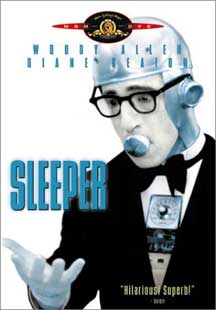 The thought of Woody Allen in a science fiction film might sound like an oxymoron for fans of the genre nowadays but that is exactly what happened in 1973 with “Sleeper.†The fact that he wrote, directed, acted and composed music for this sci-fi comedy was an impressive feat indeed.
The thought of Woody Allen in a science fiction film might sound like an oxymoron for fans of the genre nowadays but that is exactly what happened in 1973 with “Sleeper.†The fact that he wrote, directed, acted and composed music for this sci-fi comedy was an impressive feat indeed.
The film was made by Allen when he was making lightweight slapstick comedies like “Bananasâ€(1971), “Play It Again, Samâ€(1972) and “Everything You Wanted To Know About Sex*But Were Afraid To Askâ€(1972). These early films gave the former stand-up comedian a stage to perform his slapstick humor, develop his signature dialogue and also helped in the evolution of the schlemiel (Yiddish slang for a habitual bungler).
The H.G. Wells novel, “When The Sleeper Wakes†loosely serves as its main inspiration. However, Allen brilliantly parodies and satirizes classic sci-fi offerings like Kubrick’s “2001: A Space Odysseyâ€(1968) and “A Clockwork Orangeâ€(1971), “THX 1138â€(1971) by George Lucas while also taking aim at George Orwell’s futuristic novel “1984†and Aldous Huxley’s “Brave New World.â€
As he skewers the dystopian society in this film, Allen is heavily influenced by slapstick comedy masters like Buster Keaton and Harold Lloyd as well as comic masterpieces like Charlie Chaplin’s “Modern Timesâ€(1936) and the Marx Brother’s “Duck Soupâ€(1933).
The plot revolves around Miles Monroe (Allen), a Jazz clarinet musician and owner of a Greenwich Village health food store who finds himself two hundred years into the future in the year 2173, when he was cryogenically frozen after a botched peptic ulcer operation. Awakened by the rebels to be their savior, Monroe is hunted and finally brainwashed by the totalitarian government as they view him to be a threat to their so-called harmonious existence.
In this hijinks, Allen is ably supported by Diane Keaton (The Godfather, Reds, Baby Boom) as Luna Schlosser, a rich, clueless and talentless pseudo-intellectual poetess. Keaton in one of her earliest collaborations with Allen, shows off her comedic flair and timing, which would soon make her a household name with the likes of “Annie Hallâ€(1977) and “Manhattanâ€(1979), both directed and starring Allen himself.
The film also has quite a few enduring images along with its upbeat silent movie-type music.
The domination of technology over every aspect of human life, including having orgasms in an “Orgasmatron,†or using “The Orb,†a large ball to get high along with the image of Allen pretending to be a robotic servant are absolutely hilarious. Allen has the funniest line in the film when he tells Schlosser towards the end that he only believes in sex and death as they are the only two things that come once in a lifetime and with death, there is no nausea.
Allen was also thought to have discussed his ideas with the sci-fi master Isaac Asimov and employed noted sci-fi writer Ben Bova in the film. This probably shows the wit and intelligence of the film despite its zany and surrealistic look.
A testament to its caliber, “Sleeper†was even highly thought of by the sci-fi community, as it received the prestigious Hugo and Nebula Awards, given to only the finest works in the genre.
By the end, Allen seems to have put every gag, trick and one-liner in his comedic arsenal in this film and as a result, it’s still as kooky and enjoyable today.
 Not only is “Sleeper†a laugh-out-loud comedy, but like Kaushik said, it’s a pretty damn solid Sci-Fi movie as well, as long as you don’t expect as deep and intricate plot lines as “Battlestar Galactica.” It’s also one of Allen’s greatest performances and one that even his biggest haters will find something to laugh at. Even though his brand of comedy can get corny at times, it’s full of heart and wit, making it more endearing than full-on slapstick. Keaton is irrevocably cute and equally as fun in her supporting role as well, making it a quality hybrid Sci-Fi/Comedy flick that everyone is sure to enjoy if they give it a chance.
Not only is “Sleeper†a laugh-out-loud comedy, but like Kaushik said, it’s a pretty damn solid Sci-Fi movie as well, as long as you don’t expect as deep and intricate plot lines as “Battlestar Galactica.” It’s also one of Allen’s greatest performances and one that even his biggest haters will find something to laugh at. Even though his brand of comedy can get corny at times, it’s full of heart and wit, making it more endearing than full-on slapstick. Keaton is irrevocably cute and equally as fun in her supporting role as well, making it a quality hybrid Sci-Fi/Comedy flick that everyone is sure to enjoy if they give it a chance.
-Patrick Hickey Jr.

Leave a Reply